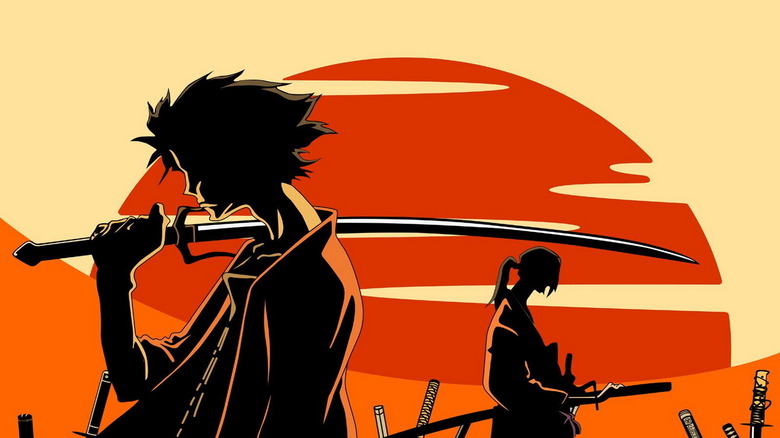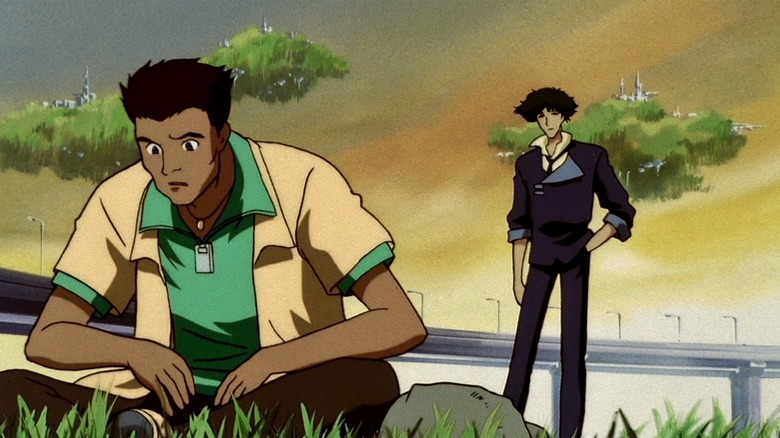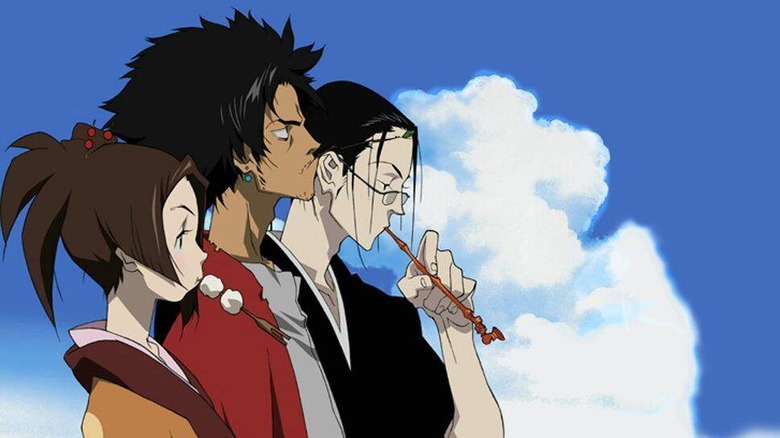Samurai Champloo Retold A Classic Cowboy Bebop Episode
As a certain creative aphorism goes, "good artists borrow, great artists steal." Who's the easiest person to steal from? Yourself. When anime director Shinichirō Watanabe was making "Samurai Champloo," his follow-up to "Cowboy Bebop," he re-used many of his previous' series traits.
"Cowboy Bebop" and "Samurai Champloo" share a loose story structure of episodic adventures, similar characters (Mugen is a scruffier Spike Spiegel), and overlapping themes about the inevitability of death. Both shows even have the same title structure; the character archetype the show focuses on followed by an important cultural influence ("Champloo" derives from Japanese word "chanpurū," a stir-fry dish or "remix").
What makes "Samurai Champloo" stand on its own feet is that Watanabe stuck these ideas in a totally different setting: Edo-era Japan instead of a colonized solar system circa 2071. Despite these different contexts, the two shows did tell similar stories. One "Samurai Champloo" episode in particular stands out as a quasi remake of a "Cowboy Bebop" one.
Waltz For Venus vs. A Risky Racket
"Cowboy Bebop" session #8, "Waltz For Venus," opens with Spike and Faye Valentine foiling a shuttle hijacking. After the two collect the fee from their rare successful bounty hunt, a starstruck passenger, Roco Bonnaro, asks Spike to take him on as a martial arts student. Spike reluctantly agrees and warms to Roco in spite of himself — until he learns his new pupil has a bounty on his head.
It turns out Roco is involved with petty crime to support his blind sister Stella; he even stole a "Grey Ash" plant from his associates because its seeds can treat Stella's condition and restore her sight. Roco is gunned down in the episode's climax, but it turns out he left some Grey Ash seeds behind for Stella, adding some sweetness to the bitter ending.
"Samurai Champloo" episode 7, "A Risky Racket," features a one-shot character similar to Roco: Shinsuke, a young pickpocket who steals money that Mugen, Jin, and Fuu won in a gambling match. When Fuu investigates, she discovers Shinsuke is only stealing to help his sick mother.
When she confronts Shinsuke, the two get cornered by a gang he stole from. Shinsuke pretends to hold Fuu hostage so they can both escape, but they get stuck in a besieged building. When Shinsuke does make a break for it, he's cornered, then stabbed, by local police. Like Spike with Stella, it falls to Fuu to give Shinsuke's mother the bad news. Unlike in "Waltz for Venus," though, there's no silver lining to Shinsuke's efforts and his mother doesn't get her needed treatment.
Where similarities end
The darker outcome is surprising since "Samurai Champloo" is usually lighter than "Cowboy Bebop." While the tone of "Cowboy Bebop" varies from episode to episode, the series as a whole has lots of ennui. "Samurai Champloo" is a goofier series with more comedy; the action can border on slapstick.
These differences come down to the show's musical inspirations. "Cowboy Bebop," naturally, has a jazz-inspired score written by Yoko Kanno. For all its variety, jazz lends itself well to melancholy. "Samurai Champloo," on the other hand, is all about hip-hop, a more upbeat and punk genre. Instead of a single composer, the score was crafted by a team of real-life hip-hop artists: Shinji "Tsutchie" Tsuchida of Shakkazombie, duo Force of Nature, Japanese record producer/DJ Nujabes, and American rapper Fat Jon.
In an interview with CBC, Watanabe revealed he had been a fan of hip-hop since his high school days, with Grandmaster Flash's "The Message" being an early favorite song. As for why he thought hip-hop was fitting music for a samurai show, he said:
"One of the things that make samurai and hip-hop very similar is that in the old days, samurai felt very strongly about representing themselves and they would represent who they were with their one sword, and rappers today are also ones who take one microphone and represent who they are..."
Watanabe added that the core theme of "Samurai Champloo" is sampling the old to make something new. Just like hip-hop does that with old music, he did so with images from old samurai movies. Watanabe may have sampled some ingredients he'd used before in "Cowboy Bebop," but like any great chef, musician, or director, he rearranged the familiar into something new with "Samurai Champloo."


